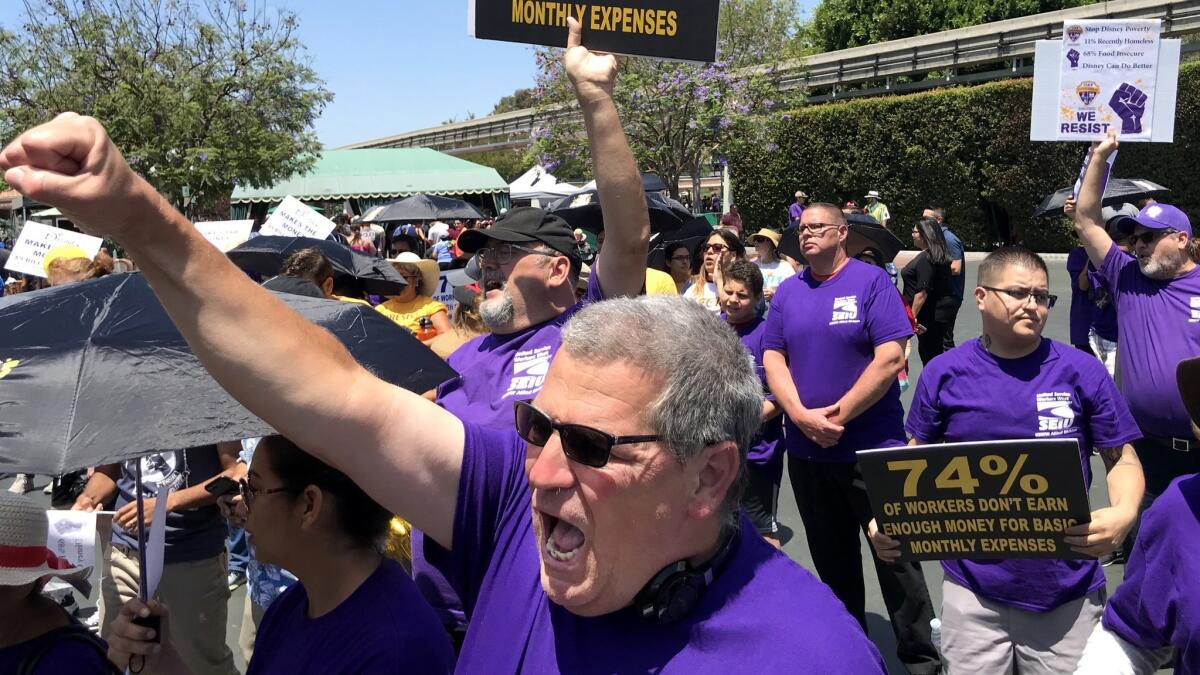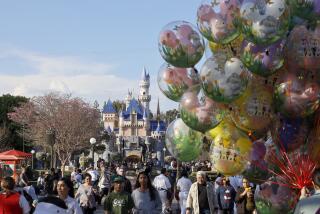Disneyland Resort reaches a tentative contract settlement with workers, ending a heated battle that lasted months

Walt Disney Co. reached a tentative settlement Monday with four unions at the Disneyland Resort, putting an end to a contentious dispute that attracted the attention of Sen. Bernie Sanders and prompted a ballot measure to require the Burbank media giant to pay resort workers a “living wage.”
Although details of the settlement were not disclosed, the agreement appears to end a heated, months-long contract dispute with about 9,700 employees who work in the eateries and retail shops, operate the attractions and provide maintenance at the two Anaheim theme parks, the Disney hotels and nearby shopping district.
For the record:
11:05 a.m. July 24, 2018A previous version of this story said the Walt Disney Co. had reached a tentative agreement with three unions. The tentative agreement was reached with the Master Services Council, which represents four unions at the Disneyland Resort.
“The Disneyland Resort and Master Services Council are proud to have reached a tentative agreement, which we are hopeful will be ratified later this week,” the park and the council that represents the workers said in a joint statement. “We have had a successful history of working together since Disneyland Park opened in 1955, and this contract continues that shared commitment to cast members.”
Union members vote on the proposed contract Thursday.
Negotiations began in April for the contract that was set to end in June. Employees have been working under an extension to the contract.
The unions have been pushing Disney to pay a “living wage” by, among other tactics, commissioning a study that looked at the economic hardship of the workers and sponsoring a rally featuring Sanders, who called on Disney to share its wealth with employees who are struggling to make ends meet.
The unions were successful in collecting at least 13,185 valid signatures — or at least 10% of the city’s voters — to put on the Nov. 6 ballot a measure requiring large hospitality companies that accept a subsidy from the city to pay at least $15 an hour, with salaries rising $1 an hour every Jan. 1 through 2022. Once the wage reaches $18 an hour, annual raises would then be tied to the cost of living.
If the measure passes, it would apply to the Disneyland Resort and at least one other high-end hotel proposed in Anaheim.
The Disneyland Resort announced last month that it had offered a 36% pay increase to the resort workers over a three-year period. The pay increase offered by Disney would give staffers a minimum of $15 an hour by 2020 — a year after the ballot measure would reach that pay scale.
California’s minimum wage went to $11 an hour Jan. 1.
But union officials said the offer included the elimination of some benefits to workers and was rejected.
During protests and rallies, union leaders cited a survey that found 73% of employees questioned don’t earn enough to pay for such expenses as rent, food and gas.
The online survey, funded by the labor groups pushing for higher wages for workers at Disneyland and California Adventure Park, also said that 11% of resort employees have been homeless or have not had a place of their own in the last two years.
The online study was conducted by the Economic Roundtable, a nonprofit research organization in Los Angeles, and the Urban & Environmental Policy Institute at Occidental College. Disney officials called the study inaccurate and biased.
To continue to put pressure on the resort, the unions were also planning perhaps their most public protest Tuesday, when workers were scheduled to begin a weeklong fast at an empty lot across the street from the Disney California Adventure Park. The protest has been canceled.
To read more about the travel and tourism industries, follow @hugomartin on Twitter.







